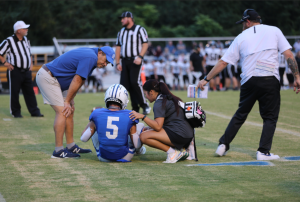The Heartbeat Law
October 27, 2021
The views expressed in this article belong to the reporter, and do not reflect the views held by Rockbridge County High School, the Prowler Staff, and its members.
Beginning in 1973, the fight for abortion rights began and have been debated up to this day. The push for a change in abortion rights increased dramatically in 2015 when the Heartbeat law was first introduced in North Dakota. The law says that an abortion is illegal as soon as a fetal heartbeat is detected within the mother. After review, the law was named unconstitutional by Roe v. Wade in the Supreme Court.
Currently, there are 11 states that have either adopted the Heartbeat Law or a version of it. Ohio, Georgia, Louisiana, Missouri, Alabama, Kentucky, South Carolina, and Texas are a few with similar laws in place. Recently, in Missouri and Texas there have been uprises about the heartbeat law.
In Texas, the name “Heartbeat Bill” is very misleading. Texas has almost completely banned abortion. Texan lawmakers, have now decided that it is illegal to have an abortion once any fetal heartbeat is detected. A heartbeat is usually detected after six weeks of pregnancy meaning that it would be difficult for a woman to know she is pregnant, making it harder for her to get an abortion if she is in need of one. Additionally, it can be hard to find out a pregnancy before six weeks and sometimes it isn’t even suspected.
State senator Bryan Hughes authored the bill in May of 2021. He was interviewed by The Texan Tribute shortly after that.
Hughes said, “The heartbeat is a universal sign of life. If a Texan’s heartbeat is detected, his or her life will be protected.”
Clearly, Senator Hughes is Pro-Life and was eager to see the bill being passed, maybe even excited.
Everyone’s body is different and every baby is different. Not all fetuses develop at the exact same rate. Because of this, many consider this bill to be “one size fits all,” meaning the people behind the bill decided that every fetus will grow at the same rate and every fetus will have a heartbeat at exactly six weeks. Some heartbeats are detected at five weeks while others are detected as late at eight weeks, it just depends on the mother.
In Mississippi, there is a bill that bans most abortions after 15 weeks, significantly before fetal viability which is when a baby could be born and kept alive with medical intervention. Viability typically begins between 22 and 24 weeks of pregnancy. This law goes against the 1973 Roe v. Wade case which decided that the Constitution gives women the right to choose between an abortion and keeping her pregnancy. In May of 2021 the Supreme Court heard multiple cases on abortion rights in the United States. The fight to change the Heartbeat bill is ongoing and the Supreme Court is expected to release its decision in Spring of 2022.
Junior Ellie Mastin was too shocked about this law when she learned about it.
“I didn’t know that the rules were this strict. It makes me sad as a girl myself because I don’t want to grow up in a world where there are laws all over my body. I am hoping there are changes made soon to take away those laws.”
Women and men all over the country are fighting for the rights of women when it comes to abortion. They will keep fighting to ensure the government upholds the rights of the Constitution as well as the rights of all women.








